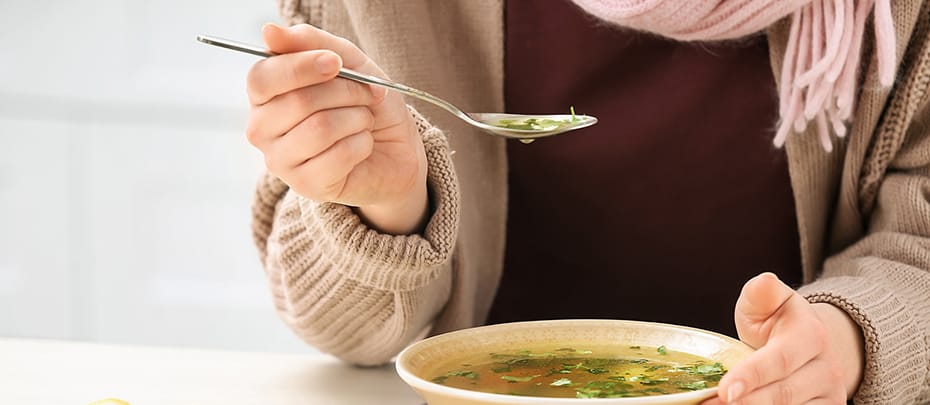Q: Why is nutrition so important when you have the stomach flu?
JW: Between nausea, vomiting and diarrhea, the stomach flu can cause you to lose lots of nutrients and fluids quickly. This can lead to dehydration, making you feel lethargic, or giving you a headache and making you feel even worse. By rehydrating with the right fluids and choosing the best foods for stomach flu recovery, you can replenish those losses and recover faster.
Infographic: How to identify signs of dehydration
Q: Who is most susceptible to dehydration?
JW: Adult bodies are 60 to 65 percent water, so dehydration is an issue for anyone with the stomach flu. But it's an even bigger concern for babies and small children because their bodies contain an even greater percentage of water than adults — about 70 to 75 percent — and they can't always tell you if they're feeling thirsty or dehydrated. Older adults are also more prone to dehydration since they may be taking medicines that are dehydrating, might forget to drink enough or they might limit their fluid intake to cut down on trips to the bathroom.
Q: What is the best strategy to combat flu-related dehydration?
JW: Start with small sips of simple fluids like water, unsweetened hot or iced tea, coconut water or an oral rehydration solution like Pedialyte®. When choosing an oral rehydration solution, look for one that contains sodium, potassium, and chloride, which are the main electrolytes lost through vomiting and diarrhea. Because these electrolytes help the brain send signals to muscles and nerves, replacing them along with lost fluids can help you feel better faster. Pedialyte has an optimal balance of sugar and electrolytes to combat dehydration during the stomach flu.
Q: For people who are wondering what to eat when they have the stomach flu, what are the best foods for recovery?
JW: This can be hard, because when you're feeling sick, sometimes the last thing you want to think about is eating. But eating can help replenish your energy and what you've lost. The best foods for stomach flu recovery are the ones that can provide your body with what it's missing and are easy to digest during recovery.
Salty crackers:
The salt helps replace lost sodium and chloride, plus they're great for nausea.
Broth-based soups:
The salt is good here too and nothing like chicken or chicken noodle soup to settle an upset stomach.
Rice:
Bland foods like rice, toast, dry cereal and pasta deliver carbs for energy but are easy to digest.
Eggs:
The protein in eggs provides important nutrition to the body and may be easier on the stomach than red meat or chicken.




Social Share